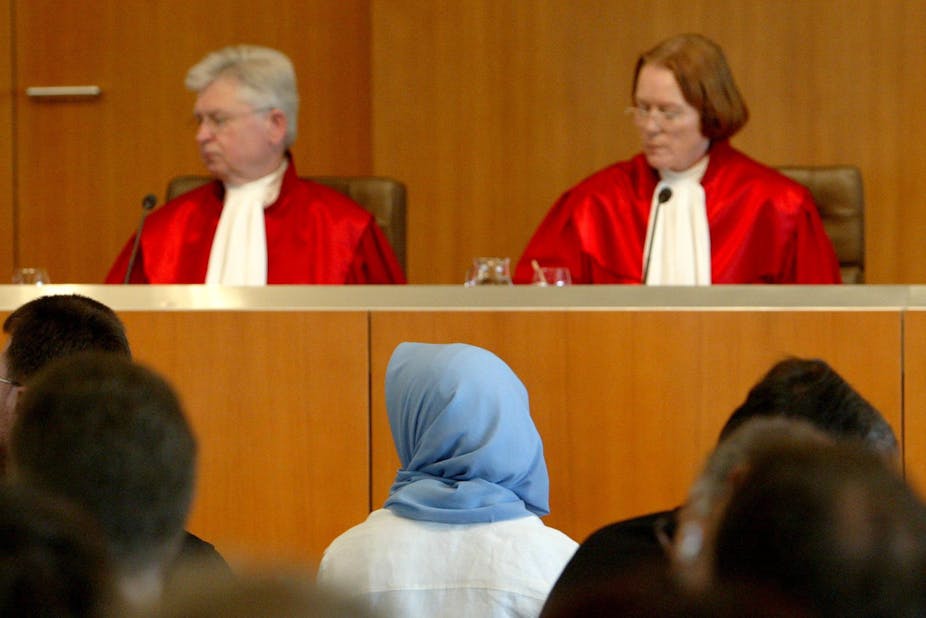After more than a decade of legal battles and public debates in Germany, the country’s highest court has ruled against North Rhine-Westphalia’s 2006 ban on teachers wearing religious dress in state schools. On March 13, the German Federal Constitutional Court decided that an absolute prohibition on the wearing of a veil (generally the hijab) by state school teachers is incompatible with the German Constitution, in particular its provision on freedom of faith and of conscience.
But the German decision came in the same week that former French president Nicolas Sarkozy argued France’s ban on the headscarf in schools should be extended to universities.
Across Europe, discussion continues about the extent to which the state can, or should, ban the wearing of headscarves or other religious symbols, such as the kippa, especially when worn by civil servants, other employees of state bodies or with public functions, or even by students of state schools. It has become a wide-ranging, contentious and divisive debate.
Legal challenges
Several countries in Europe have already prohibited the burqa in public spaces. In a 2004 Act, France prohibited the “adoption of signs or behaviours manifesting affiliation to a religion in state schools”, so restricting the freedom of both teachers and pupils based on its unique model of secularity or laïcité. France also has a ban on face veils in public spaces, and the European Court of Human Rights (ECHR) upheld the law in July 2014.

In Switzerland and Turkey, teachers and students respectively have also been prohibited from wearing the hijab, and the laws have won the approval of the ECHR. Yet these decisions regarding Switzerland and Turkey have been rightly criticised as excessively restrictive and poorly justified. The ECHR used arguments relating to state religious neutrality, the need to protect children from undue religious influences and the right of parents to educate their children according to their religious beliefs. These arguments all seemed clearly insufficient to justify any such drastic limitation on the right of individuals to freedom of religion and to wear certain clothes.
The UK has not remained immune from this debate. Both teachers and pupils have judicially challenged some of the restrictions on their freedom to wear certain religious attire, and courts are still in the process of clarifying the applicable law.
In Germany too, there have been some restrictive measures put in place throughout the last decade. Earlier decisions of the Federal Constitutional Court have accepted that the legislation of the German Länder (states) could lawfully impose a restriction on teachers’ religious dress. Yet, the Court has been somewhat sympathetic to the rights of complainants and conceded that state neutrality did not necessarily prevent state school teachers from wearing the hijab.
Getting the state out of our wardrobes
The debate on freedom of religion and the manifestation of religion through dress codes inevitably leads us to consider a range of fundamental rights: the right to privacy, the right to development of one’s personality, the right to equality, freedom of expression and the rights of minorities. Others have considered these issues within a wider discussion on the rights of parents, children, teachers and minorities, as well as on crucial aspects of national identity, multiculturalism, Islamophobia, secularism and liberalism.
These debates betray very clear – often narrow – understandings of individual autonomy, gender equality and religion. Many restrictions are justified within current preoccupations with global security, which can inevitably lead to even greater social tensions and limitations to individual rights. This is particularly relevant in educational contexts, where children should learn to respect differences and cherish diversity, rather than to fear and hate “the Other”.
“State neutrality” should not be used as an excuse for inactivity, as German lawyers Karl-Heinz Ladeur and Ino Augsberg have already argued. Prohibiting the burqa in public spaces may well be necessary for public security reasons as authorities need to be able to identify individuals. Yet banning religious symbols in the public arena altogether would be inappropriate as well, and should not be carried out on the basis of any model of secularism or neutrality. A more balanced and nuanced legal framework needs to be achieved.
Long live multiculturalism
Not long ago British prime minister, David Cameron, and the German chancellor, Angela Merkel, announced the failure of multiculturalism. Now this recent German court decision seems to be telling society that it has to keep trying: giving up on multiculturalism is not an option.
Only time will tell whether the decision will have an impact across borders and whether this approach will be emulated in other European countries. This would undoubtedly represent a welcome sea change, doing away with pointless restrictions on religious freedom and extreme models of secularism. Hopefully, multiculturalism is not dead yet – and will not be for a long time to come.

